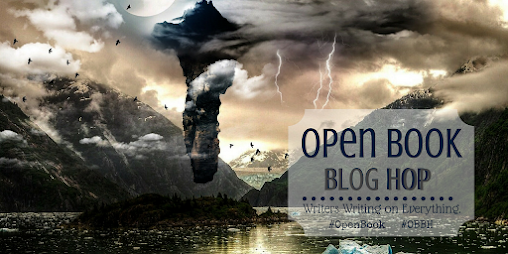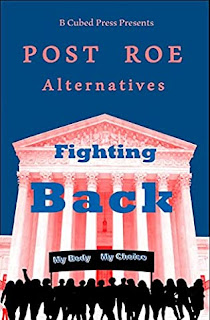Welcome to Open Book Blog Hop. You can find us every Monday talking about the writing life. I hope you'll check out all the posts: you'll find the links at the bottom of this post.
Do you tackle current political turmoil in your stories or avoid it? Tell us why.
____________________
Oh dear.
Now that's a doozy of a question.
Here's the thing: there's no such thing as apolitical.
Here. Other people have said it better than I can:
Even choosing not to "be political" is a political choice, because it is a choice not to challenge or engage with the status quo. Silence is a statement, and leaves it to others to interpret what it means. They'll probably assume you agree with them.
But, at the same time, I don't see the point in constant outrage and confrontation. Choose your battles, as they say. Save your strongest voice for things you feel the strongest about. Otherwise you're just angry all the time, and all the yelling will leave you raw. I don't want confrontation just for confrontation's sake, but there are moments when I will feel myself a coward if I don't speak.
I don't shy away from talking about big issues in my writing, but I don't necessary focus on "current political turmoil" either, preferring mostly to stay a little more timeless than that.
My Menopausal Superheroes series has a lot to say about aging, living as a woman, work-life balance, friendship, boundaries, sexism, racism, ageism, and many other issues, but it's in the story indirectly, as it affects the characters. They don't spout off about their political views for no reason--but because something happening in the story makes them take action or say something.
Sometimes the problem with writing about very timely topics is that your work has an expiration date.
All the same…
The most directly I tackled current political turmoil in one of my stories was in my short story, "No Country for Young Women," published in Post Roe Alternatives: Fighting Back.
Given the title of the anthology, you can probably figure out what political issue the stories within are tackling.
My story was mostly about the need for people to take notice of what's going on around them, and realize that what affects one human should matter to us all. It's about the dangers of not engaging.
It's not the most overtly political story in the anthology, but then again, it doesn't shy away from frank assessment.
If you read it, you'll have no doubt how the characters feel, and you'll have some suspicions of what the author might think and believe, too.
It was a different kind of writing for me, more realistic than most of my work and I found it cathartic to write, but it's not my usual cup of tea. It was one of those moments, though, when I felt I would feel myself a coward if I did not speak.
I do find that readers sometimes conflate the writer and her characters. I have written characters who feel very differently about the world and the people in it than I do, and in the reviews, I see that some readers assume that if my character espouses a view, it must be my view, too. That's not always true.
I write to understand--to understand myself, others, and the world. That means grappling with things that scare and upset me, even if I do so through a lens of speculative fiction and have a heck of a lot of fun while I'm doing it.
For me, writing is an act of empathy, and I want to understand what all my imaginary people are going through, to live it as if it is my own experience and grow from that effort. So, yes, it's political. It can't help but be so.





Understanding other people's point of view is a gift that not many people have.
ReplyDeleteI don't know if I have it or not, but I have a willingness to try and sometimes I think I've succeeded.
DeleteI choose to be apolitical - I have no trust in any politician at all.
ReplyDeleteI have similar doubts--pretty much if you *can* get elected in our system, it's a sign you *shouldn't* be elected.
DeleteThe trick is not to let your own emotions override those of your characters. Many of mine have radically different views to me, we have learned to co-exist.
ReplyDeleteI think of them as my imaginary friends, so of course they are different than me.
DeleteA big downside to including politics is the possibility that your readers think your character's views are your views. And that may not be a good thing. Tweeted.
ReplyDeleteIt can be a problem at times, but most readers seem to understand the difference between the author and the characters.
Delete"Saying we can't discuss religion or politics pretty much leaves us with discussing the weather. It's cold. I guess we could stare at one another a while."
ReplyDeleteThat's a paraphrase of an Alaskan saying from when I was a kid. I use our current political battles to inform my day-after-tomorrow fictional world. When I started the series seven years ago, I could not have conceived of how bizarre politics would get.
I love it. At least in Alaska the weather would be interesting enough to talk about.
Delete